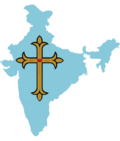From Wikipedia, the free encyclopedia
Ecumenical church in Kerala, India
Nilakkal St. Thomas Ecumenical Church is one of the earliest Christian churches in Kerala , India . This church is one among the Ezharappallikal St. Thomas , one of the twelve apostles of Jesus Christ.[ 2]
Nilakkal, also known as Chayal is a forest area, but once it was a place of great importance carried on trade with Madhura and Thirunelveli.[ 2] [ 1]
Since the old church is in a dilapidated stage, a new church has been constructed in a site not far from it. The new church is at Angamoozhy , 3 kilometres (1.9 mi) away from Nilakkal , almost 52 kilometres (32 mi) east to Ranni in Pathanamthitta District of Kerala . At present time, this church functioning as an ecumenical church maintained by various Episcopal Churches in India.[ 3]
Denominations Religious Related
Kasaragod Kannur Wayanad Kozhikode Malappuram Palakkad Thrissur
Basilica of Our Lady of Dolours, Thrissur Fathima Matha Chapel, Kandeswaram Mar Sleeva Syro-Malabar Church, Mapranam Marth Mariam Cathedral Marth Mariam Cathedral Mary Matha Syro-Malabar Church, Ollur Our Lady of Lourdes Metropolitan Cathedral Our Lady of Perpetual Help Church, West Chalakudy Pazhanji Church Pazhuvil Church St. Antony's Forane Church St. Francis Xavier's Church, Sampaloor St. Francis Xavier Forane Church, Velur St. Joseph Chapel, Americankettu North West St Mary's Church, Cheloor St. Mary's Syro-Malabar Forane Church, Chalakudy St. Thomas Cathedral, Irinjalakuda St. Thomas Syro-Malabar Church, Palayoor Ernakulam
Marthoma Cheriapally Kothamangalam St.Mary's Cathedral Kothamangalam Mar Sabor and Mar Proth Church, Akaparambu Church of Our Lady of Hope CSI Immanuel Church, Ernakulam Don Bosco Church, North Paravur Holy Magi Syro-Malabar Forane Church, Muvattupuzha Kadamattom Church Karingachira Church St. Peter and St. Paul's Church, Kolenchery Kottakkavu Mar Thoma Syro-Malabar Church, North Paravur Little Flower Church, Kaprassery Mar Hormizd Syro-Malabar Church, Angamaly St. Mary's Forane Church, Arakuzha Marthoma Cheria Pally Kothamangalam Mary Queen Church, Thoppil Nadamel Marth Mariam Church Santa Cruz Cathedral Basilica, Kochi Vallarpadam Basilica Varapuzha Basilica St George church, Vypin St Louis Church, Mundamveli St Thomas' Church, Thuruthur Our Lady of Immaculate Conception Church, Manjummel St. Antony's Church, Kodanad St. Francis Church, Kochi St. George Syro-Malabar Basilica, Angamaly St. George's Forane Church, Edappally St. George's Syro-Malabar Church, Thalayolaparambu St. John the Baptist Church, South Parur St. Jude Church, Kidangoor St. Mary's Simhasana Church, Veliyanad St. Sebastian's Church, Udayamperoor St. Thomas More Syro-Malabar Church, Alakode (Meenmutty) St. Thomas Church, Kokkamangalam St. Thomas Syro-Malabar Church, Malayattoor St. Philomena's Forane Church, Koonammavu St.Thomas Dayara, Vettikkal Idukki Kottayam
Holy Family Syro-Malabar Church, Mannila Immaculate Heart of Mary Cathedral, Kottayam Mar Aphrem Church St Antony's Syro-Malabar Forane Church, Kurumpanadam St. George Orthodox Church, Puthuppally St. George's Syro-Malabar Catholic Forane Church, Aruvithura St. Mary's Church, Kottayam St. Mary's Jacobite Syrian Cathedral, Manarcad St Mary's Metropolitan Cathedral, Changanassery St. Mary's Syro-Malabar Major Archiepiscopal Church Kuravilangad St. Thomas Cathedral, Pala St. Thomas Church, Arunoottimangalam Vettikkunnel church Alappuzha Pathanamthitta
Arohana Marthoma Church, Anicadu Bethel Marthoma Church, Chengara Holy Innocents' Church, Mezhuveli Kadammanittapally Kadampanad Church Kannamcode Cathedral Mar Thoma Sleeha Syro-Malabar Church, Thulappally Nilackal St.Thomas Church Sacred Heart Church, Mylapra St. George Orthodox Church, Chandanapally St. George Orthodox Church, Mylapra St. Ignatius Monastery Manjinikkara St. John's Cathedral, Tiruvalla St. Mary's Church, Niranam St Mary's Orthodox Church, Kallooppara St. Thomas Marthoma Church, Kozhencherry Kollam Thiruvananthapuram


